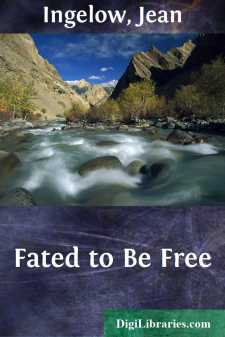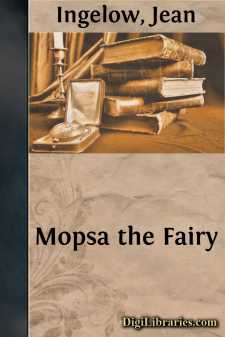Categories
- Antiques & Collectibles 13
- Architecture 36
- Art 48
- Bibles 22
- Biography & Autobiography 813
- Body, Mind & Spirit 142
- Business & Economics 28
- Children's Books 17
- Children's Fiction 14
- Computers 4
- Cooking 94
- Crafts & Hobbies 4
- Drama 346
- Education 46
- Family & Relationships 57
- Fiction 11829
- Games 19
- Gardening 17
- Health & Fitness 34
- History 1377
- House & Home 1
- Humor 147
- Juvenile Fiction 1873
- Juvenile Nonfiction 202
- Language Arts & Disciplines 88
- Law 16
- Literary Collections 686
- Literary Criticism 179
- Mathematics 13
- Medical 41
- Music 40
- Nature 179
- Non-Classifiable 1768
- Performing Arts 7
- Periodicals 1453
- Philosophy 64
- Photography 2
- Poetry 896
- Political Science 203
- Psychology 42
- Reference 154
- Religion 513
- Science 126
- Self-Help 84
- Social Science 81
- Sports & Recreation 34
- Study Aids 3
- Technology & Engineering 59
- Transportation 23
- Travel 463
- True Crime 29
Fated to Be Free
by: Jean Ingelow
Description:
Excerpt
CHAPTER I.
A WATCHER OF LILIES.
"Unto whom all hearts be open, all desires known, and from whom no secrets are hid."—Collect, English Communion Service.
In one of the south-western counties of England, some years ago, and in a deep, well-wooded valley where men made perry and cider, wandered little and read less, there was a hamlet with neither farm nor cottage in it, that had not stood two hundred and fifty years, and just beyond there was a church nearly double that age, and there were the mighty wrecks of two great oak-trees, said to be more ancient still.
Between them, winding like a long red rut, went the narrow road, and was so deeply cut into the soil that a horseman passing down it could see nothing of its bordering fields; but about fifty yards from the first great oak the land suddenly dipped, and showed on the left a steep cup-like glen, choked with trees, and only divided from the road by a few dilapidated stakes and palings, and a wooden gate, orange with the rust of lichens, and held together with ropes and bands.
A carriage-drive was visible on the other side of the gate, but its boundaries were half obliterated by the grass and weeds that had grown over it, and as it wound down into the glen it was lost among the trees. Nature, before it has been touched by man, is almost always beautiful, strong, and cheerful in man's eyes; but nature, when he has once given it his culture and then forsaken it, has usually an air of sorrow and helplessness. He has made it live the more by laying his hand upon it, and touching it with his life. It has come to relish of his humanity, and it is so flavoured with his thoughts, and ordered and permeated by his spirit, that if the stimulus of his presence is withdrawn it cannot for a long while do without him, and live for itself as fully and as well as it did before.
There was nothing to prevent a stranger from entering this place, and if he did so, its meaning very soon took hold of him; he perceived that he had walked into the world of some who were courting oblivion, steeping themselves in solitude, tempting their very woods to encroach upon them, and so swathe them as in a mantle of secrecy which might cover their misfortunes, and win forgetfulness both for their faults and for their decline.
The glen was about three hundred yards across, and the trees which crowded it, and overflowed its steep side encroaching over the flat ground beyond, were chiefly maples and sycamores. Every sunbeam that shot in served to show its desolation. The place was encumbered with fallen branches, tangled brushwood, dead ferns; and wherever the little stream had spread itself there was a boggy hollow, rank with bulrushes, and glorious with the starry marsh marigold. But here and there dead trees stood upright, gaunt and white in their places, great swathes of bark hanging loose from their limbs, while crowds of young saplings, sickly for want of space and light, thrust up their heads towards the sunshine, and were tied together and cumbered in their struggle by climbing ropes of ivy, and long banners of the wild black vine....





